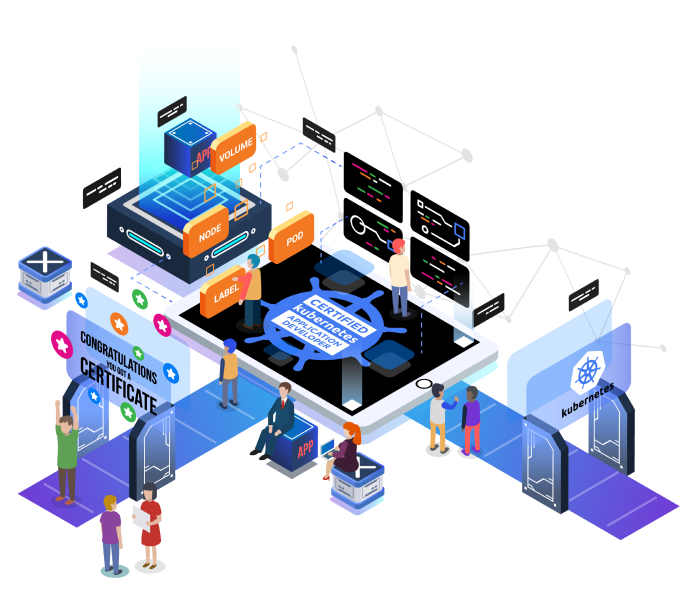Kubernetes Advanced Networking (en)
This course provides in-depth training on advanced network configuration and application security in Kubernetes. You will explore the implementation of a powerful CNI such as Cilium and learn how to manage pod connectivity. You will delve into how Kube Proxy works and traffic routing strategies. The course will also cover topics such as internal and external traffic policies, session affinity, inter-cluster communication, DNS configuration, and encryption of data in transit. You will be able to implement advanced solutions to ensure security and optimize the performance of Kubernetes applications.
By participating in this course, you will gain advanced skills to manage complex networks and improve the security of your applications in a Kubernetes environment. You will develop your professional skills as a container and orchestration expert and be ready to tackle the most demanding challenges in the field of distributed systems management.
COD: DSK301
Category : Kubernetes

Teaching Methodology
The course includes educational laboratories in which each student will be able to work in order to complete training exercises that will provide practical experience in using the instrument, for each of the topics covered during the course.
Prerequisites:
- Experience configuring Kubernetes: it is preferable to have hands-on experience configuring a Kubernetes cluster, including use of tools such as kubectl and understanding of YAML manifest files.
- Networking knowledge: it is helpful to have a solid understanding of basic networking principles, including concepts such as IP addressing, subnetting, routing, and network protocols.
- Familiarity with security policies: it is advisable to have a general understanding of application security policies, such as authentication, authorization, and encryption.
- Basic knowledge of cybersecurity concepts: it is helpful to have a basic understanding of common security threats and recommended practices to protect applications and data.
- Familiarity with containerization concepts: it is advisable to have a basic understanding of containerization concepts, such as Docker and resource isolation principles.
At the end of the course the participants will be able to:
- Understand in depth advanced network configuration in a Kubernetes environment, gaining skills to manage pod connectivity and optimize traffic routing.
- Learn the installation and configuration of Cilium, a Kubernetes networking plugin, to ensure reliable, high-performance connectivity between pods.
- Learn how to use the Kube Proxy with IPTABLES and IPVS to implement efficient and scalable traffic routing strategies within the Kubernetes cluster.
- Develop skills to manage Kubernetes application security, including traffic policies, session affinity, and encryption of data in transit.
- Explore communication between multiple clusters and gain skills to configure reliable and secure communication between different Kubernetes clusters.
- Understand and configure essential network components in Kubernetes, such as Endpointslices, Multiple IngressClass, Network Policy Advanced and Gateway API.
- Deepen knowledge of key concepts such as Kubernetes DNS, Kubernetes CoreDNS and integration with external DNS services.
- Gain advanced skills to improve security and optimize Kubernetes application performance through proper configuration of network security policies.
Educational program
- Installing Cilium
- Installing the Sample Application
- Pod Connectivity Fundamentals
- Understanding Kube Proxy with IPTABLES
- Understanding Kube Proxy with IPVS
- External and Internal TrafficPolicy
- Session Affinity
- HostNetwork
- Endpointslices
- Multiple IngressClass
- Network Policy Advanced
- Network Policy Scenario
- Kubernetes DNS
- Kubernetes CoreDNS
- External dns
- Encrypting data in Transit
- Gateway API
- Multi Cluster communications
Duration – 2 days
Delivery – in Classroom, On Site, Remote
PC and SW requirements:
- Internet connection
- Web browser, Google Chrome
- Zoom
Language
- Instructor: English
- Workshops: English
- Slides: English
The price of this two-day course is € 1200 + VAT.











